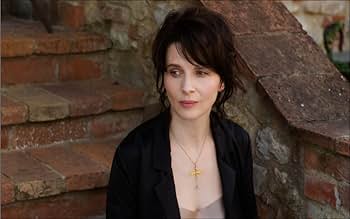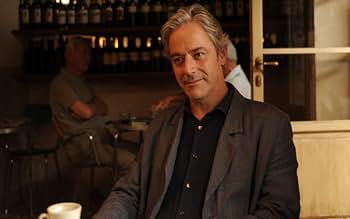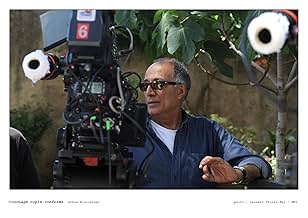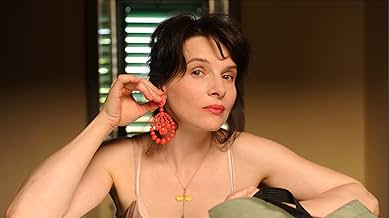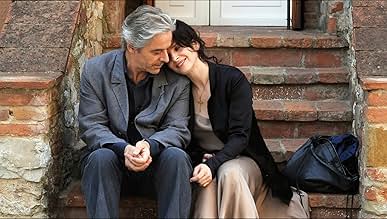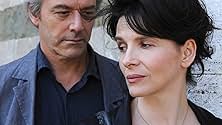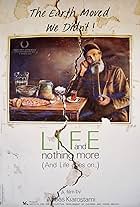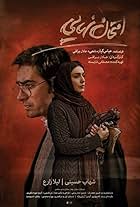In Tuscany to promote his latest book, a middle-aged British writer meets a French woman who leads him to the village of Lucignano. While there, a chance question reveals something deeper.In Tuscany to promote his latest book, a middle-aged British writer meets a French woman who leads him to the village of Lucignano. While there, a chance question reveals something deeper.In Tuscany to promote his latest book, a middle-aged British writer meets a French woman who leads him to the village of Lucignano. While there, a chance question reveals something deeper.
- Director
- Writers
- Stars
- Awards
- 11 wins & 29 nominations total
- Le marié
- (as Filippo Troiano)
- La mariée
- (as Manuela Balsinelli)
- Director
- Writers
- All cast & crew
- Production, box office & more at IMDbPro
Featured reviews
Or was it mistake? It becomes clear that these people have some connection with each other, whether they are divorced, former lovers or something entirely separate, and the conversation becomes much more biting and intriguing. Writer/director Abbas Kiarostami keeps us gripped into this conversation, as these two ponder on the copies of the world, along with the tribulations of a marriage, what makes a good husband, what makes a good father and so much more. She attacks him for being such an absent father (is her son really his?) and he explains that sometimes one partner in the marriage just has to be gone and that's the way the world is. The film poses so many interesting questions on the world and leaves it up to the viewer to decide the answers for themselves. Each character has their own strong opinion, but Kiarostami never takes a side and tells the viewer the resolution. It's a powerful picture that keeps you thinking long after it's over.
Part of the power of course relies on the strength of the performances, and both of these actors knock it out of the park. William Shimell was the perfect choice for the distant, simple author. Juliette Binoche, however, steals the show, with an authentic and brave performance that ranks up with some of her absolute best. She is arguably the finest actress in cinema today, and has a grasp on portraying vulnerability that very few actors can come close to achieving. Within her you really see the pain of a woman scorned and the exhausting life led by a single mother constantly having to think of someone other than herself. She is everything here; emotional, strong, falling apart and beautiful. It's a perfect performance in a magnificent film. I feel like this is a picture that will only get better on repeated viewings, and it's still quite strong on the first one.
It has originality - it will not be like other films seen recently in mainstream European cinema, there is little or no plot, or action, rather we dealing with conversation, and the state of the heart and the mind in a fiercely non-Hollywood fashion. This is a film about thinking about emotions, and is almost non-linear in its conversations and if that concept doesn't appeal then it may well not be viewable.
It is, however, despite itself, pretty mesmerizing - what will they say next? what other aspect of why relationships fail and succeed will be tossed into the salad? who are they? why the games? etc;
The conversations are both alienating and intimate, and have a "play-acting" aspect that allows the psychosexual aspect of how we adults explore potentiality to be examined in a way that is normally reduced to sexual tension and flirting on film. This is a film that demands attention - this is not dumb film-making. I recognize the conversations and the feeling well, but in a sense the connection is too contrived to be really successful - but it certainly touches that part of intimacy that is normally, at best, ethereal.
The setting of Chianti and a beautiful hot summer day, with cicadas and a wonderful small town to explore, lightens this - but it remains a film for philosopher romantics. It is, as others here have noted in better ways than me, film as film - here there are images and shots that work to compliment the alienation and solipsistic nature of the two leads.
A film about questions that offers few answers, it is certainly intriguing and if you are into human exploration and condition worth the effort to watch.
He comes to her antique shop and invites her to drive around. However, she takes James to the village of Lucignano. While they are traveling, he autographs six books she had bought and they discuss the subject of his book. When they arrive in the village, they are mistakenly taken as husband and wife and the woman decides to play the game and soon the bitter James Miller assumes the role of her husband.
I am not a fan of Abbas Kiarostami, but I see his movies since they are usually challenging and open to interpretations. I have just seen "Copie Conforme" on DVD and I have my understanding of the story that may be or may be not the real intention of this Iranian writer / director.
Juliette Binoche's character definitely knows James Miller and there are evidences: first, she has a reserved spot in his lecture; then her son comments that she had decided to fall in love with the British writer; last, when James arrives in her antique shop, they do not introduce themselves to each other and they are not too formal as strangers certainly would be.
I believe that James Miller first met her years ago while she was walking on street with her son following her but never together. She probably would be a single mother with rejection to her son and on that occasion they might have become lovers or they had at least a love affair in the hotel that they visit in the end but James probably would be married.
They travel to the romantic village of Lucignano and they have a long discussion about copies and originals art works. When the owner of the cafeteria believes that they are married, the French woman plays games with James Miller pretending that they have been married for fifteen years, probably because she might have wanted to be his wife in the past. In the end, there is a parallel with the central subject of the story, copies vs. originals, and the drama turns into a faithful copy of a romantic comedy with a long-term marriage. My vote is seven.
Title (Brazil):"Cópia Fiel ("Faithful Copy")
They stop in a museum before the picture of a portrait, thought for centuries to be the original, though lately discovered to have been only a perfect copy. What value has changed in this object, what new perception now regards it, this is where I believe this is best unraveled.
Things change the man quips philosophically, an intellectual much like Kiarostami perhaps. Yet we see the same cypresses standing by the same old road, the same plazas and hotels they once visited, then young and booming with love. Having spoken so well, we see however that the man understands little of that. He can't even enjoy a simple glass of wine without complaining that it is corked, what should be a simple pleasure is tainted by the gross irritation that comes from too much satisfaction. Having satisfied our desires so many times, in so many different ways, we can see that we are no closer to happiness.
Where does this weariness then, born from too much familiarity, from having seen or tasted too much, come from and why does it invest our gaze with this constant dissatisfaction? Another line of thought to connect the web of allusions. The woman, who has made herself beautiful for him in the day of their anniversary, says he doesn't see her anymore. He looks at her but doesn't see, meaning something has dissipated with time, grown withered in his eyes, though she is still the same, except a little older.
Kiarostami perfectly visualizes the burden that saddles these people in the scene where they are driving around town in the car. On the windshield we see cast over their faces the reflections of buildings gliding by, not simply the gap that exists between them, indeed between any two human beings, but the burden of time, life passing them over. In a poignant metaphor, we see them move through existence.
A perfect copy, the original, two identical objects which we are taught to perceive differently. The lines being the same in the same places, the hues of color painted exactly the same, the one intrinsic value that separates the two is merely time. Which is to say that as humans, who wither away with time, we allow ourselves to regard it as the most precious good, the one we cannot buy or sell. The movie shows us how, although we may understand our transience as an idea, we live as though we will always be here, as though we have time enough to postpone a small gesture of affection.
But if we simply perceive the world around us, this present moment? This draught of air now coming from an open window or this glass of wine? Or indeed this woman who has made herself beautiful for us?
This is a great film by one of the few gifted filmmakers of our times, perhaps his first truly great one. In the right ears, this will be a sutra that will permit us to meditate on fundamental precepts of existence, how time thought to matter matters little, how craving and ego blind us. How ultimately, like a mandala upon which Tibetan monks work tirelessly day and night only to destroy it upon completion, life is to be lived in full, with knowledge that it will come to pass.
Storyline
Did you know
- TriviaDuring a visit in Tehran by Juliette Binoche, Abbas Kiarostami told Binoche the synopsis of Certified Copy as a casual anecdote, which she said that she fully believed until he confessed to having made it up. According to Kiarostami, studying the reactions of Binoche as she listened to the story was a vital part of the film's further development.
- Quotes
James Miller: It seems to me that the human race is the only species who have forgotten the whole purpose of life, the whole meaning of existence is to have fun, to have pleasure. And here is someone who's found their own way to do it. We shouldn't judge them for it. If they're happy and enjoying life, we should congratulate them, not criticize them.
- ConnectionsFeatured in Breakfast: Episode dated 31 August 2010 (2010)
- SoundtracksO surdato 'nnamurrato
Written by Aniello Califano (as A. Califano) and the music by Enrico Cannio (as E. Cannio)
- How long is Certified Copy?Powered by Alexa
Details
- Release date
- Countries of origin
- Official sites
- Languages
- Also known as
- Sao Y Bản Chính
- Filming locations
- Production companies
- See more company credits at IMDbPro
Box office
- Budget
- €7,000,000 (estimated)
- Gross US & Canada
- $1,373,975
- Opening weekend US & Canada
- $77,937
- Mar 13, 2011
- Gross worldwide
- $7,736,632
- Runtime1 hour 46 minutes
- Color
- Sound mix
- Aspect ratio
- 1.85 : 1
Contribute to this page





